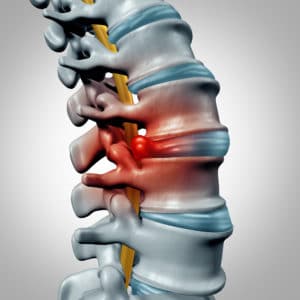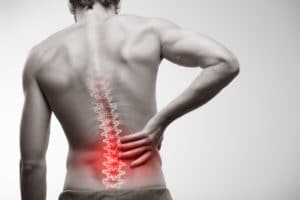The backbone, or spine, is a series of bones and discs stacked one upon another. The discs that sit between each pair of vertebrae are round and relatively flat, somewhat like a jelly donut. The purpose of spinal discs is to prevent friction between vertebrae and to aid in preserving space along the spine for nerves to exit. Discs are durable, with a fibrous outer layer. They are also cushiony, with a soft, gel-like center. The position and structure of spinal discs make them vulnerable to degradation and injury. One such injury is herniation.
What Is A Herniated Disc?
A herniated disc typically occurs in the lumbar region of the back and is one of the most common causes of back pain. Cervical discs can also become herniated which results in neck and shoulder pain. Located between the bones, or vertebrae of the spine is an intervertebral disc. These discs provide support and flexibility within the spine.
However, if these discs become damaged they can tear or move out of place and become herniated.

A herniated disc is a common condition that may occur as a result of gradual wear and tear on the disc or from an injury to the spine that cracks or tears the disc and causes it to bulge or break open.
Herniated Disc Symptoms
Patients with a herniated disc may experience pain, numbness, and weakness in the affected area as the disc presses on the nearby nerve roots. The location of the affected disc determines the location of the pain. A herniated disc in the lower back may cause pain through the buttock and down the leg, a condition known as sciatica.
Pain from a herniated disc may be worse during activity and then get better during rest. Anything that puts pressure on the nerve, such as coughing sneezing, sitting or bending forward, can cause pain to worsen. If the herniated disc does not touch any nerves, patients may not experience any pain from this condition.
What Dr. Lipani’s Patients Say
"Dr. Lipani is the finest neurosurgeon! Compassionate, Caring, Down to Earth with his professionalism; he is the best! My son Alan, had an L-4/ L/5 Spine Fusion, 7.5 hour surgery and I can not thank the “Great Doctor”/Surgeon for his dedication, kindness and caring."
"The Doctor outstanding in every way possible. Explaining every detail and taking his time to do so. Amazing for a surgeon to be so informing of the procedure to me and my wife. After the surgery he came out and explained everything to me. My wife is doing great after the cervical spine fusion, moving her arm in ways she hasn’t in years and getting her feeling back in her fingers"
"Dr. Lipani and his staff are excellent. Dr. Lipani was very thorough. He explained what needed to be treated and why. He has terrific bedside manners. He answered all my questions patiently. Did not rush me at any time. I recommended him to one of my friends and she was extremely happy with him too."
What Causes A Herniated Disc?
A disc may become herniated when extreme or persistent pressure is exerted upon it by the vertebrae on each side. This sandwich-like pressure forces some or all of the inner gelatinous substance within the disc through the outer shell. A herniated disc can be an ongoing problem that causes pain along the nerve path of the affected spinal segment. Most herniated discs occur in the lumbar spine, or lower back. Lumbar herniation is one of the common causes of low back pain and sciatica leg pain. Though not as common, herniated discs may also develop in the neck or mid-back.
Risk Factors For A Herniated Disc
Herniation of a disc often occurs when the outer layer, the annulus, is weakened. There are a few factors that have been identified as contributing to this problem. These include:
- Disc degeneration due to aging
- Excessive weight
- Traumatic injury such as an auto accident or fall
- Extreme strain from lifting a heavy object

Is A Herniated Disc The Same Thing As A Slipped Disc Or Bulging Disc?
The term slipped disc is synonymous with a herniated disc. Bulging disc, on the other hand, is a term that may apply to another common spinal condition.
Discs are susceptible to wear and tear over time. As the body ages, discs can stiffen and become dehydrated. These conditions cause changes in the structure of the disc, making it bulge to one side or another or all the way around its perimeter. A bulging disc is one in which only the outer layer of fibrous material is affected.
A herniated disc occurs when a crack or tear occurs in the stiff outer annulus and some of the inner gel protrudes from this injury. Because inner matter leaks from a herniated disc, this spinal condition is more likely to cause pain in a compressed or inflamed nerve.
Diagnosing A Herniated Disc
Dr. Lipani can diagnose a herniated disc through a combination of methods including image testing such as an MRI. Additionally, he will perform a physical examination including checking reflexes, posture, and muscle strength. After testing, Dr. Lipani will also ask you questions about your symptoms in order to rule out other conditions.

Herniated Disc Treatment
Treatment for a herniated disc depends on the location and severity of the condition. In many cases, symptoms will improve on their own within a few weeks or months. Patients should rest, use a heating pad and perform therapeutic exercises in order to manage pain, in addition to taking pain medication prescribed by your doctor. Improving your posture may also be effective in relieving pain and helping a herniated disc heal.
For more severe cases patients may require surgery to treat a herniated disc. Surgery is usually reserved for patients whose pain does not improve over the course of a few months.
When Should I Get Surgery For My Slipped Disc?
The choice to undergo spinal surgery for a herniated disc is one that we attempt to make over time. In some cases, surgery is the immediate response to a traumatic injury. Most herniated discs relate to wear and tear on the spine, giving the patient time to consider all treatment options, such as medication and physical therapy. Surgery is usually recommended when the clinical situation demonstrates a lack of successful results with conservative therapies. The objective of herniated disc treatment is to achieve an acceptable and lasting degree of relief from back pain.
Surgical Treatment of Herniated Disc
Surgery may be necessary to improve comfort if therapeutic modalities do not adequately address pain. Depending on clinical data, Dr. Lipani may consider common techniques such as:
- Arthroplasty, a surgical procedure that replaces part or all of the herniated disc.
- Discectomy surgery removes the damaged disc entirely.
- Laminotomy, which removes the lamina and surrounding tissue that are pressing on the nerve root.
- Spinal fusion, which joins two vertebrae together, may be combined with the discectomy procedure to support spinal stability.
Spinal Surgery With Dr. Lipani
At Princeton Neurological Surgery, Dr. Lipani is a board certified fellowship trained spine surgeon and specialist in treatment for a herniated disc in New Jersey. Dr. Lipani treats patients from around the world as well as locally from Princeton, New Brunswick, Hopewell, Pennington and communities throughout Somerset, Middlesex, Ocean, Burlington, Monmouth, Morris and Mercer Counties for all forms of spinal conditions such as disc herniation, spinal stenosis, cervical myelopathy, degenerative disc disease and others. We use approaches including the latest in minimally invasive procedures, tailored to the needs of each patient.
What Happens If A Herniated Disc Goes Untreated?
Some people have a herniated disc for years before symptoms become noticeable and concerning. Once the disc has torn, it does not repair itself. This means that the compression and irritation on surrounding nerves are likely to worsen over time. Back and leg pain caused by a herniated disc can worsen to a loss of sensation or muscle control.
Schedule A Consultation
For state-of-the-art treatment of a herniated disc or other spinal conditions, please schedule a consultation at one of our convenient locations in Hamilton, Bridgewater, or Morristown, New Jersey! Call our Princeton office at (609) 890-3400, or our Somerset office at (908) 718-0539. You can also click here to send us an email contact form, or to find the contact information for our Morristown, Union, or Paramus offices. Dr. John Lipani and his talented staff look forward to serving you!

